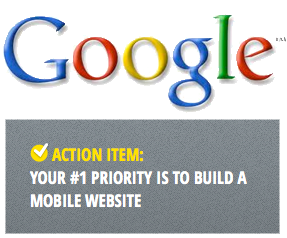How Mobile Devices Are Changing Your Business
Mobile phone usage and internet traffic are growing at a staggering rate, causing powerful changes in consumer behaviour and in the way people socialise and work together. You’ve likely used your phone to search for local businesses, share photos, updates and web sites with friends, and of course play countless hours of mobile apps.
The shift to mobile devices has important implications for how businesses should be allocating their marketing budget. Most company websites are not easy to use on mobile devices, meaning they are increasingly irrelevant to the average consumer. If you want to attract new customers, build rapport with existing clients or offer new services or other value online, then mobile is on the must-do list.
Planning a website or any other marketing exercise without considering how people will interact with it via their mobile devices is no longer acceptable.
Your #1 Priority is to build a mobile website” – Google’s Mobile Playbook.

In Google’s excellent Mobile Playbook website the search giant spells out the importance of mobile sites for businesses. The Mobile Playbook is an online whitepaper for how your business needs to embrace the mobile revolution.
Google’s plan for your future business success: go mobile
In the Mobile Playbook Whitepaper website Google lays out a clear pathway for your business to get online, grow, succeed – and of course spend a fair amount in advertising with them along the way. Here are some key points for businesses to note in how they plan their marketing and business development in future years.
- Get a mobile website
- Consider mobile apps to market your business
- Be visible – harness the power of mobile search
- Optimise, Optimise, Optimise
- Use mobile advertising to grow your business
- Consider users with various mobile devices
- Use mobile technology within your company to boost productivity
How mobile can help your business grow
Mobile searches have grown 5x in the last 2 years and are about to outstrip desktop searches. Leading your industry in the mobile marketing space will be key to growing your business in the next 2 years.

Mobile advertising allows a new generation of hyper-local search, with Google, Apple and other providers able to recommend nearby restaurants, accommodation and businesses based on your verbal request or even on simply knowing your travel plans (no search required).Google also emphasises how wide open the mobile advertising space remains:
“Mobile is the most imbalanced medium when it comes to ad spending versus time spent, at 1% compared to 23%” – Google
This imbalance creates great opportunities for companies which move early into the mobile marketplace – investment in developing a mobile friendly online presence will yield greater returns than expenditure in most other advertising and marketing segments.
Are mobile websites and apps really the best answer for businesses?
The Mobile Playbook website is an extensive and well organized resource on why your business needs to embrace mobile. In it Google places a very strong emphasis on the need for mobile websites and apps. Their recommended strategy is basically to create a mobile version of your site, and maybe a tablet version (did we mention you may need separate apps for iOS, Android and other platforms?), and to develop mobile apps to market your business.
In considering these options it is worth bearing in mind that this whitepaper is geared toward CEOs and business owners, so Google have tried to keep things simple. Before you rush out and build a couple of extra websites and mobile apps specifically for today’s popular devices, it is important to remember that the device landscape is changing very quickly. Building native apps for iPhone, iPad, and Android devices can cost thousands of dollars each – and that “must-have” iPhone app could seem old hat or even obsolete in a year as consumer preferences change.
Mobile responsive design – one site fits all
A new approach to mobile-friendly web design is to create a website which will detect and adjust to the size of the device it is viewed on. Mobile responsive website design means a single site works well on all devices, future-proofing your website as new devices become popular.
Responsive design is an attractive alternative to separate mobile apps because it gives the same content to different device users, tailored to their screen size. Responsive design also means you won’t need to maintain a second website. This is great news because most businesses struggle to keep one website up to date. A separate mobile site or mobile app can be preferable when mobile users are the primary target, or when the high cost of developing native mobile apps is justified by the potential returns.
Mobile website or app? Meet the Web-App
A mobile responsive website can be designed with app-like functionality and can usually be added as a web app to mobile devices. This can effectively eliminate the need to design separate apps and mobile websites for multiple devices.
Start preparing your business for the new mobile economy
The take-home message of all this is simple – mobile technology will be a driving force behind consumer behaviour patterns for the foreseeable future. Make sure your business is planning for existing and projected changes in how your customers find, reach and perceive you, which will be increasingly influenced by mobile device usage patterns and preferences.
It is important to make a start now, but also remember this is an ongoing process. Rapidly changing technology means business success has become a moving target.
Start preparing your business for the mobile revolution: make sure you have a mobile website and a mobile marketing plan and start thinking like Google. You are now in the mobile business!